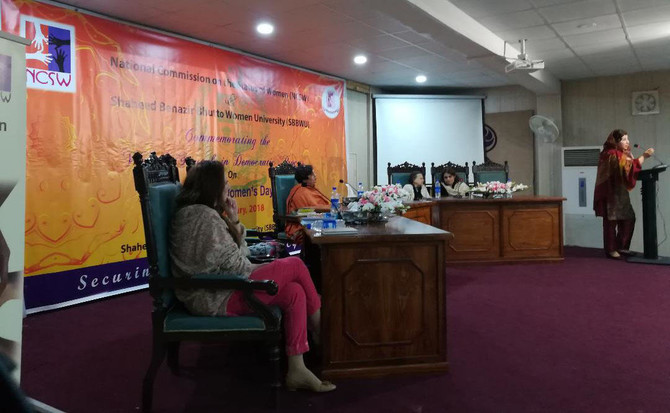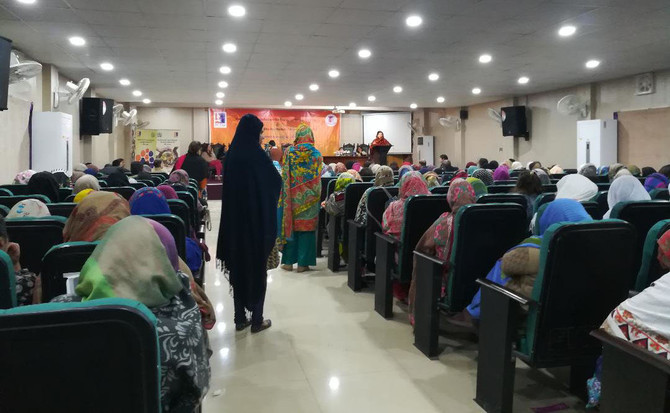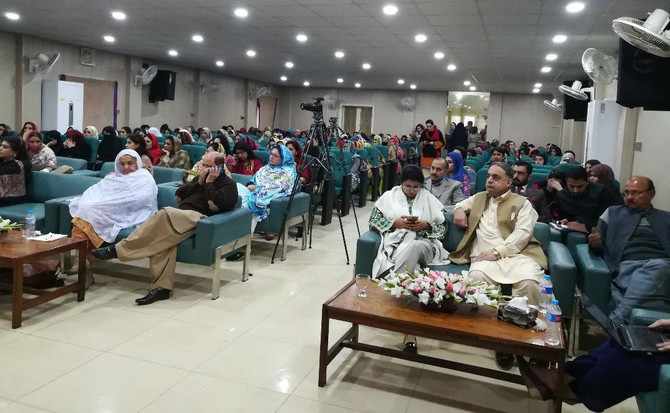PESHAWAR: Speakers at a seminar on “Women’s Role in Democracy” in Peshawar said on Monday that education and hard work can produce good female leaders, although it requires a great deal of effort and time for them to emerge in a male-dominated society.
The seminar was jointly organized by the National Commission on the Status of Women (NCSW) and Shaheed Benazir Bhutto Women University (SBBWU) in connection with Tuesday’s National Women’s Day.
Talking to Arab News, Neelum Toru, chairperson of NCSW’s Khyber Pakhtunkhwa (KP) chapter, explained that while International Women’s Day is observed on March 8 each year, Pakistan’s National Women’s Day is observed on Feb. 12 because on that day in 1983, the Punjab Women Lawyers Association staged a rally in Lahore against the late Gen. Ziaul Haq’s Law of Evidence — which stated that, in certain civil matters, a woman’s testimony was worth just half that of a man’s.
“The protesters were beaten, tear-gassed and arrested,” Toru said.
The speakers at the seminar included Toru; Anoosh Khan, chairperson of the Center for Gender Studies at the University of Peshawar; Gulalai, programs director of NGO Khwendo Kor; Zubaida Khatoon, human rights activist; Samina Afridi, professor at Peshawar University; Mossarat Qadeem, CEO of Paiman Trust; Maryam Bibi, CEO of Khwendo Kor; and Dr. Huma Qureshi of NCSW.
The speakers lauded prominent Pakistani women who have excelled in their respective fields and presented them as role models for young women. They urged female university students to register to vote and to take informed decisions during the next election, later this year.
The participants also paid tribute to the recently deceased human rights activist Asma Jahangir and her struggle for women’s rights in Pakistan.
Dr. Razia Sultana, vice-chancellor of SBBWU, said in her opening address that awareness of the need to educate girls and allow young women to join the workforce is increasing.
“One should not give up in the face of challenges and threats,” she said. “Challenges can also be opportunities, and threats can make one strong.”
Speaking to Arab News after the event, Dr. Sultana said: “Women are largely restricted to the role of mother in our society and such stereotypes are the main hindrances faced by women here. However, change is taking place and women are also assuming leadership roles now.”
She said universities play an important role in creating an educated culture that can produce good female leaders, adding that she hopes women will be given more opportunities to take up roles in politics and other areas of power.
Asked if modern society can produce leaders like Benazir Bhutto and Asma Jehangir, she said: “BB was a product of her era. And in this modern era, the education rate of women is increasing, which means women have a more conducive environment to play their role.”
The seminar was intended to raise awareness about women’s rights, and to pay tribute to women who were tortured and arrested during Gen. Zia’s era, Toru told Arab News.
“I think a woman could also become a political leader like Benazir Bhutto today, with hard work and dedication,” she said, acknowledging Bhutto’s political struggle for democracy.
Discussing female leadership at the seminar, Zakia Shah, a student of Law at SBBWU, said Asma Jehangir was her role model among female leaders in Pakistan.
“Women leaders are not promoted in Pakistan,” she added.
Syeda Maleeha Zainab Hashmi, an English student, lauded the contribution of her university’s vice-chancellor and other women who advocated the right to education. She said Bhutto was a role model for her and an exemplary Pakistani leader, adding that persistence and hard work were the only way forward for women.
Rights activists urge greater role for women on Pakistan’s National Women’s Day
Rights activists urge greater role for women on Pakistan’s National Women’s Day

Pakistan army says three militants attempting to infiltrate from Afghan border killed

- Kabul government denies it allows militants to use its soil to attack Pakistan
- Pakistan has seen sharp rise in militant attacks across the country in recent months
ISLAMABAD: The Pakistan army said on Tuesday it had killed three militants out of a group that had tried to infiltrate its frontier with neighboring Afghanistan in the northwestern North Waziristan district, calling on Kabul to ensure “effective border management” on its side.
Islamabad, facing a sharp rise in militancy in recent months, says the Tehreek-e-Taliban Pakistan (TTP) group uses Afghanistan as a base to launch attacks and that the ruling Taliban administration has provided safe havens to the group along their shared border. The Taliban government in Kabul denies this.
The TTP is separate from the Afghan Taliban movement but pledges loyalty to the group that has ruled Afghanistan after the US-led international forces withdrew in 2021.
“On night 25/26 November, movement of a group of khwarij [militants], who were trying to infiltrate through Pakistan-Afghanistan border, was picked up by the security forces in general area Hassan Khel, North Waziristan District,” the army said in a statement. “Own troops effectively engaged and thwarted their attempt to infiltrate. Resultantly, three Khwarij were sent to hell.”
The statement said Islamabad had “consistently” been asking the Afghan government to ensure effective border management on their side of the border.
“Interim Afghan Government is expected to fulfil its obligations and deny the use of Afghan soil by Khwarij for perpetuating acts of terrorism against Pakistan,” the army added.
“Security Forces of Pakistan are determined and remain committed to secure its borders and eliminate the menace of terrorism from the country.”
What has caused Pakistan’s deadly clashes between police and supporters of Imran Khan?

- Topping the demands of Khan’s Pakistan Tehreek-e-Insaf party is the release of all its leaders, including Khan
- PTI supporters say they will hold ‘do or die’ sit-in at public square near parliament that is a popular protest site
Thousands of supporters of Pakistan’s jailed former Prime Minister Imran Khan marched on the capital Islamabad this week, breaking through barricades and clashing with police in response to his call for a sit-in protest.
Here is a look at what led to the protest and this chapter of political rallies in Pakistan:
WHAT DO PROTESTERS WANT?
Topping the demands of Khan’s Pakistan Tehreek-e-Insaf (PTI) party is the release of all its leaders, including Khan, who has been jailed on a series of corruption charges since August 2023.
They also seek the resignation of the current government over what they call rigged general elections this year.
PTI supporters from across the country, including Khan’s wife Bushra Bibi, have marched on the capital, with large numbers coming from the party’s stronghold in the northern province of Khyber Pakhtunkhwa.
They have vowed to enter the capital and rally at a public square near parliament that is a popular protest site, holding what leaders have called a “do or die” sit-in.
HOW HAS THE GOVERNMENT RESPONDED?
Prime Minister Shehbaz Sharif’s government has given no indication yet of bending to the demands. Authorities have used shipping containers to block major roads and streets in Islamabad, with police and paramilitary patrolling in riot gear.
Mobile Internet links are down and schools have been closed for several days in the capital and the nearby garrison city of Rawalpindi. Gatherings have been banned in Islamabad.
WHAT HAS HAPPENED SINCE THE MARCH BEGAN?
Thousands of supporters clashed with police and paramilitary troops on the weekend, as they tried to enter Islamabad.
Both sides have reported injuries and the prime minister’s office said members of the paramilitary were killed when they were run over by a car in the protest convoy. The interior ministry put the number of those killed at four.
WHERE DO THE PROTESTERS WANT TO GO?
The marchers aim to reach the roundabout near parliament that has long been a rallying point for protests and sit-ins that have marked Pakistan’s turbulent politics for decades.
The site is in Islamabad’s heavily fortified red zone, home to parliament, key government installations, luxury hotels, embassies and the offices of foreign organizations.
WHAT IS THE HISTORY OF POLITICAL PROTEST IN PAKISTAN?
Stormy politics and unrest during Pakistan’s 77-year history have included protests and sit-ins by opposition parties.
Khan led one of Pakistan’s largest sit-ins in 2014 when his supporters protesting against the PML-N government occupied the roundabout site for 126 days.
PTI supporters last marched on Islamabad in October, sparking days of clashes with police that killed one officer.
Ex-PM Khan party’s protest disrupts petrol supply in Islamabad, Punjab— oil transporters

- Authorities have sealed off roads leading to Islamabad with containers to deter protesters
- Several pump stations have run out of petrol due to non-delivery, says oil tankers association
ISLAMABAD: The supply of petrol to Islamabad and several cities in Pakistan’s eastern Punjab province has been “severely affected” due to a protest by former prime minister Imran Khan’s party, an oil tankers association said on Tuesday, as major roads and highways leading to the capital were sealed off.
Pakistani authorities started closing highways and motorways leading to Islamabad in many parts of the country with shipping containers on Saturday, ahead of a “long march” to Islamabad by Khan’s party.
Authorities also said on Sunday they were closing certain sections of the motorway due to maintenance work. These sections were: M-1 Islamabad to Peshawar, M-2 Islamabad to Lahore, M-3 Lahore to Abdul Hakeem, M-4 Pindi Bhattian to Multan, M-14 Hakla to Yarik and M-11 Lahore to Sialkot.
The closed routes had stalled the delivery of petrol to several parts of Punjab and Islamabad, Oil Tanker Contractors Association spokesperson Noman Butt said.
“Routes to Islamabad, Rawalpindi and North Punjab are closed due to which supply from petrol tankers is severely affected,” Butt said in a statement.
“Thousands of tankers are waiting for the route to open.”
Butt said petrol had not been supplied to Gujranwala, Jhelum, Sialkot and Kharian districts in Punjab for the last three days.
He said petrol supply has also been affected in Islamabad, Kohala, and the northern city of Gilgit.
“Petrol has run out at pumps in many cities,” he added.
Khan’s party aims to pressure the government to end his imprisonment, which has lasted for over a year on what his party contends are politically motivated charges.
The party also aims to raise its voice against alleged rigging in the Feb. 8 general elections while calling for measures to ensure judicial independence, which it says has been undermined by the 26th constitutional amendment. The government denies this.
Thousands of Khan supporters arrived at D-Chowk, a high-security area in Islamabad’s Red Zone that houses key government buildings and is a popular site for protests, on Tuesday afternoon.
His supporters, led by the former prime minister’s wife Bushra Khan, braved teargassing, arrests and clashes to reach D-Chowk where they plan on staging a sit-in protest to demand his release.
Pakistan’s interior minister said three Rangers personnel and a Punjab Police constable had been killed in the clashes. The PTI rejects its supporters were responsible for their deaths.
Pakistan to build its first indigenously designed and built frigate-sized warship — naval chief

- Frigates are designed for surface warfare, anti-submarine warfare and have air defense capabilities
- Pakistan has been actively working to bolster its naval capabilities by inducting advanced warships
ISLAMABAD: Pakistan Naval Chief Admiral Naveed Ashraf said this week that the country is building its first indigenously designed frigate-sized warship called “Jinnah Class Frigates” to address the challenges presented by the prevalent multi-threat maritime environment.
A frigate-sized warship is a multi-mission naval vessel, typically 100-150 meters in length, with a displacement of 2,000-4,000 tons. Frigates are designed for surface warfare, anti-submarine warfare, and have air defense capabilities. They are equipped with a mix of guns, missiles, torpedoes, and anti-submarine rockets.
Pakistan has been attempting to bolster its naval capabilities through the induction of advanced warships. Recently, it inducted PNS Babur and PNS Hunain, two state-of-the-art vessels, into its fleet. These warships are part of a broader effort to enhance the country’s maritime security and operational readiness.
In an interview with Naval News website on Monday, which covers naval defense and technology, Pakistan Navy chief Admiral Ashraf highlighted that the Pakistan was focusing on inducting modern platforms, force multipliers, and indigenization apart from ensuring a variety of options to reduce reliance on external sources.
“Based on experience gained during the construction of MILGEM Class Ships, the Pakistan Navy is planning to build JINNAH Class Frigates which will be our first ever indigenously designed and built frigate-sized warship,” he said.
The report said Pakistan inducted Type 054 A/P Frigates from China, OPVs Batch-1 and Batch-II from Romania, and MILGEM Class Corvette from Turkiye, adding that these will add to the navy’s existing defense capabilities.
PNS Babur, constructed in Turkiye and PNS Hunain, an offshore patrol vessel from Romania, are equipped with cutting-edge technology to address both surface and air threats.
“Pakistan Navy is in the process of inducting the remaining MILGEM class ships as two of these ships are being constructed indigenously in Pakistan (KS&EW),” the naval chief was quoted as saying.
“Our development strategy is based on ‘progressive capability enhancement’ to create a balanced, potent, and combat-ready force to deal with the evolving threats through the acquisition of force multipliers, and indigenous and innovative technical solutions.”
Zimbabwe win toss and elect to bat in 2nd ODI against Pakistan

- Pakistan suffered 80-run humiliating loss to Zimbabwe in first ODI on Sunday
- Tayyab Tahir and leg-spinner Abrar Ahmed debut for Pakistan in second ODI
BULAWAYO: Zimbabwe won the toss and elected to bat in the second one-day international against Pakistan on Tuesday.
Pakistan made two changes after Zimbabwe recorded a stunning 80-run win on DLS method in the rain-affected first match to lead the three-game series 1-0 on Monday.
Middle-order batter Tayyab Tahir and leg-spinner Abrar Ahmed were awarded ODI debuts in place of Haseebullah Khan and fast bowler Mohammad Hasnain.
Haseebullah got dropped after making 0 in his debut ODI while Hasnain made way for Abrar with the wicket expecting to slow bowlers.
Zimbabwe didn’t tinker with its winning combination after Pakistan struggled against both pace and spin in the first game.
Pakistan have rested its frontline white-ball players Shaheen Shah Afridi, Naseem Shah and Babar Azam as they tested bench strength ahead of next year’s Champions Trophy.
Bulawayo will host the third and final ODI on Thursday and will also host both teams in the three-match T20 series.













